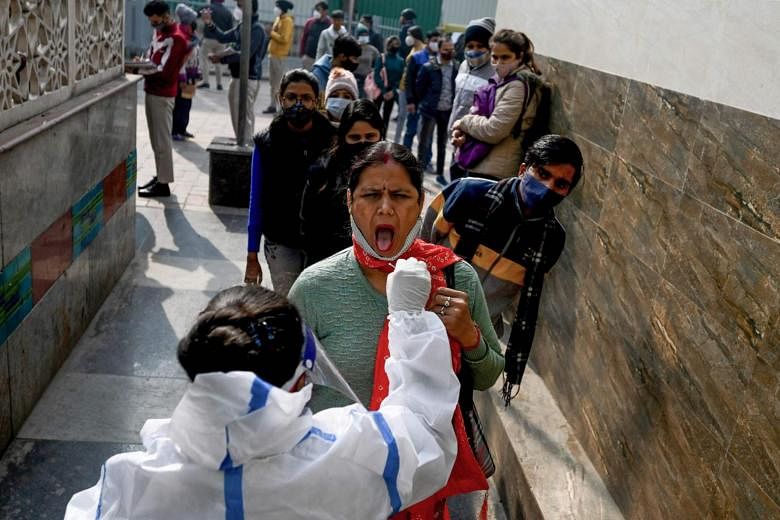BANGALORE - Omicron cases are rising rapidly in India, with the number now touching 1,700 in total since the first two were recorded on Dec 2.
Metropolitan cities like Delhi, Mumbai and Kolkata account for more than 75 per cent of cases of the recently identified variant of the coronavirus, said Dr N K Arora, chairman of the Covid-19 working group of the National Technical Advisory Group on Immunisation.
Omicron has overtaken Delta as the dominant variant in major cities, but state health authorities are still monitoring the latter closely, as it causes more severe symptoms and fatalities.
"India is clearly in the third wave of Covid-19, and the whole thing seems driven by Omicron," Dr Arora told news channel NDTV.
At least 86 per cent of the total number of Covid-19 cases reported over the past two days in Delhi were infected with the Omicron variant. The national capital, which struggled with overwhelmed hospitals and depleted oxygen supply during the second wave of the pandemic last year has recorded more than 382 Omicron cases.
On Tuesday (Jan 4), Delhi chief minister Arvind Kejriwal tested positive for Covid-19. He is suffering mild symptoms and has isolated himself at home. Health authorities have yet to identify the variant which infected him.
The western state of Maharashtra - the worst hit by Covid-19 last year - has the highest share of reported Omicron cases, at 568.
The state has banned gatherings of more than five people until Friday, but the health department has indicated it may extend the restriction.
Mumbai, the densely populated state capital, has tightened isolation rules, with the municipality announcing that a whole residential building would be sealed if more than a fifth of flats had Covid-19 patients.
The eastern city of Kolkata in West Bengal too has set up containment zones, and has restricted incoming flights from Mumbai and Delhi to twice a week.
Other states to report Omicron cases include Kerala with 182, Gujarat with more than 152 and Tamil Nadu with more than 121.
South Africa announced the presence of Omicron on Nov 24 and the World Health Organisation declared it a variant of concern three days later.
Shortly after Dec 2, when India recorded its first two cases, the government revised international travel, testing, containment and surveillance guidelines. As Covid-19 cases began rising at a rate consistent with the surge globally, Indian states aggressively implemented measures to curb the spread.

Most banned New Year's Eve celebrations and imposed night curfews in the week leading up to Jan 1. Still, between Dec 27 and Jan 2, infections rose dramatically across the country by 181 per cent.
Gujarat, Delhi, and Haryana saw their highest daily spike in Covid-19 cases in nearly seven months.
The coastal state of Goa, whose economy is largely dependent on tourism, did not impose restrictions on New Year festivities, and this led to a huge influx of visitors last week.
A video showing hundreds of people walking on a road near Baga Beach in North Goa on Jan 1 was widely shared on Twitter. "This is a royal welcome to the Covid wave. Mostly tourists," wrote @Herman_Gomes, a local journalist who shared the video.
More than 10 per cent of tests in Goa are now showing positive for Covid-19, double the previous week. A ship with at least 2,000 people and bound for the coastal state is now sailing back to Mumbai after 66 of those aboard tested positive.
Schools and colleges, which were reopened only recently, have been ordered to close in Goa till Jan 26, and a night curfew has been imposed from 11pm to 6am in the state.
Other states including West Bengal, Haryana, Odisha, Tamil Nadu, Karnataka, Telangana and Uttar Pradesh have also decided to close schools.
This week, India started offering the Covid-19 vaccine cleared for emergency use for 15- to 18-year-olds. Many high schools were coordinating with health authorities to offer the vaccine on their premises, but have had to forgo their plans amid closures.
Experts note that the number of deaths and hospitalisations are still relatively low even though Covid-19 case numbers are mounting.













